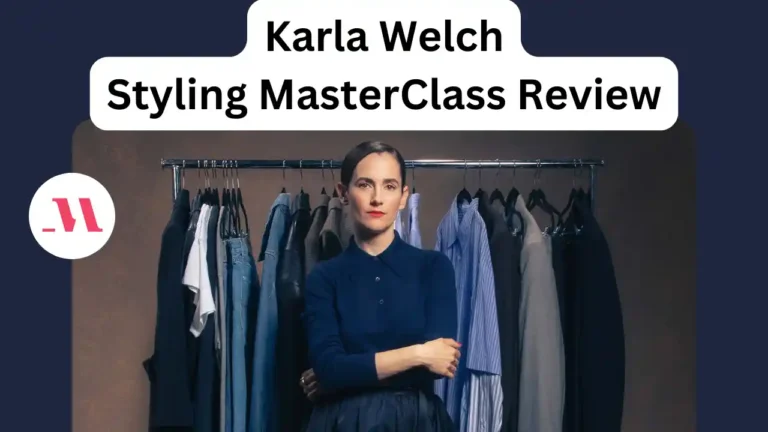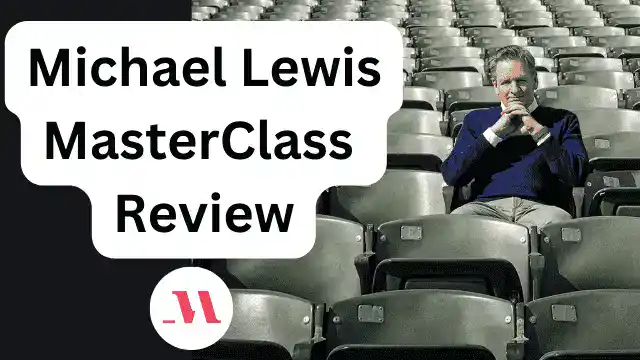Coursera Plus - Get Unlimited Access to 7,000+ Online Courses
Coursera Plus - Get Unlimited Access to 7,000+ Online Courses
Coursera Plus - Get Unlimited Access to 7,000+ Online Courses
I took Indra Nooyi’s 3 Hours Leadership MasterClass (Review)
Disclaimer: This post is NOT sponsored. Some product links are affiliate links which means if you buy through those links, you won’t pay anything extra and we’ll also receive a small commission on a purchase.
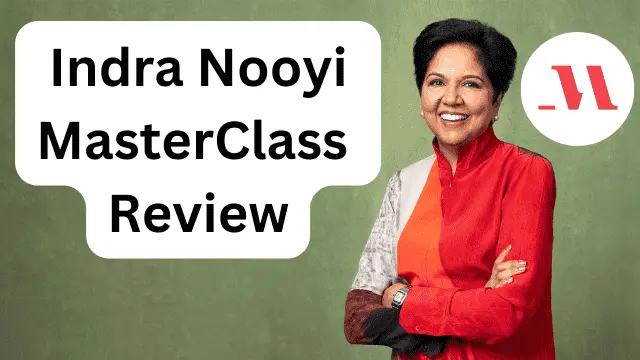
I started watching Indra Nooyi Teaches Leading with Purpose bright-eyed and bushy-tailed to see what I could learn from the former CEO of PepsiCo.
I was considerably impressed with how detailed the Masterclass was. It’s worth sitting through 3 hours of video to learn about leadership from her.
But, many other classes and books could help you gain leadership skills. So, what’s unique about this class? The assignments, duh. They make you internalize what you learned and use it to complete them.
Nooyi explains how to go about finishing the assignment and doesn’t rush off like our professors who yell out the assignments just before leaving the room. Let’s see how else her lessons benefit you at length.
Who is Indra Nooyi and Why Should You Learn From Her?
Indra Nooyi is a highly successful business executive. She is renowned for her transformative leadership that led to PepsiCo’s significant growth and success during her tenure as the CEO.
Her proven track record of shifting the company’s focus to healthier products while increasing market value simultaneously speaks of her tremendous leadership skills. That is why you should learn from her.
Who is this MasterClass for?
This course is for all aspiring leaders and those wanting to know more about strategic thinking and its implementation. It doesn’t matter whether you are a young management graduate wet around the ears or a senior executive; you will learn a lot from this class.
Pros and Cons
I concede that this is an interesting and informative class, but even it has some flaws. Let’s see what they are.
What Will You Learn?
You will learn how to become a better leader and thinker. Analyzing problems and finding solutions will become second nature if you follow her advice.
You will gain insights into how she combined purpose and performance to keep PepsiCo successful over the years. The core principles apply to all businesses. So, keep an open mind and take a deep dive into this class.
Here is my lesson by lesson breakdown.
Class on 7 C’s of Leadership
Nooyi’s 7 C’s are the core abilities you need to possess in order to be an effective leader. She devised them based on her decades of experience in the business field. Let’s analyze them one by one.
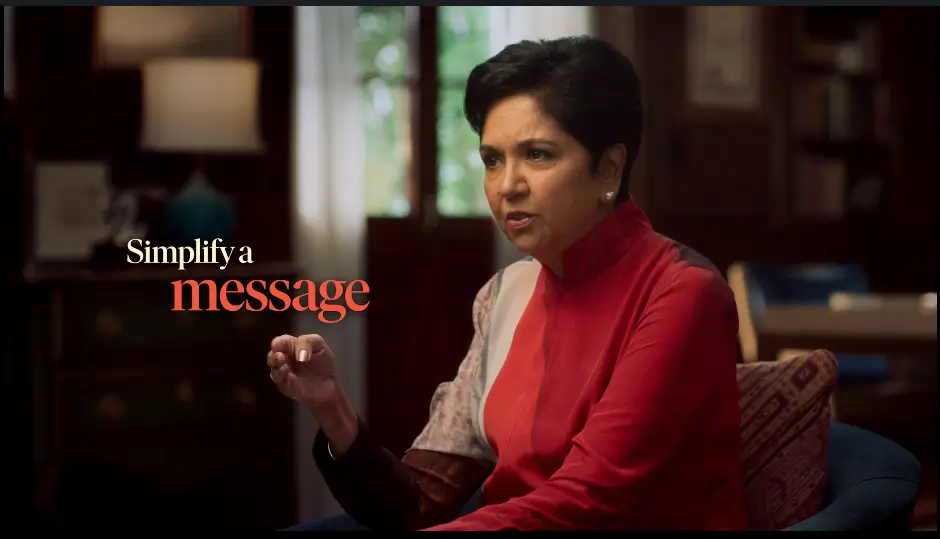
Competence
Having a degree from a prestigious institution may help you get your foot in, but it’s your capabilities that ensure your continued presence in the organization. People begin to ask questions about your core competence. What are you good at, and how does that benefit the company?
Remember how Peter Burke sasses Harvard graduates in the pilot episode of White Collar? He is annoyed that they couldn’t tell him what the paper fiber he found was. Neal Caffrey, the criminal, is the one who clues him in. So, degrees aren’t everything.
Nooyi recommends developing a hip pocket skill – a skill you are extremely competent at and helps run the company or adds value to it in some way. This competence proves you belong in the organization. Her hip pocket skill is simplifying complex concepts and problems to get to the core. Once you develop a hip pocket skill, stay an expert on that.
Creativity
Curiosity leads to creativity. What is creativity? According to Nooyi, it’s connecting the dots of seemingly unrelated shapes. It’s not something taught in business school, but you need to develop nonetheless. To connect the dots, you need to understand the concept first. The bottom line? Figure out the fundamentals first.
Assignment: Find the germ of an idea. You have to pick five industries and figure out how the idea came about and how it was pushed until it gave rise to an industry. She doesn’t leave you high and dry. She explains the method she used to understand cryptocurrency. This assignment helps hone your critical thinking skills.
Building on what she has said so far, Nooyi explains how she connects the dots. She spent a day every 4 or 6 weeks with her R&D department and took up some voluntary independent reading on technology to ask them questions. When she said that, my mind immediately flashed to Hermione saying ‘I took this out for some light reading’ thumping through a heavy book the size of my head. How do people do it? I guess, you need to have the drive.
Moreover, Nooyi explains why you shouldn’t view the various departments as separate. They are all interlocked. It’s great that you are learning all this, but the catch? You may not understand all this if you have never set foot in a company before.
Her explanation made sense to me as I had watched an anime focusing on the editorial department of a publishing company in the Manga industry. The anime taught me how the editing, production, sales, and marketing departments worked together. It’s funny how I learned more from the anime than from my professors.
Courage
Nooyi explains the importance of standing up for your point of view. She instructs how to deal with criticism and provides tips for making people understand what you want to convey. She had to conceptualize her idea in five ways to convince her boss that her proposed approach was right. She also tells you how to build the courage and confidence required to do that. So, quite a useful lesson, in my opinion.
Communication
The key takeaway from this lesson is that you must learn to simplify the message and communicate it effectively. She explains how indicative thinking, active listening, and a few choice, well-placed words can contribute to effective communication. Nooyi also advises us to learn from people adept at moving a discussion, that has been running in circles, forward.
Assignment: Study great orators. She provides a few examples of fantastic speeches and how to learn from them. I don’t like listening to speeches but I was spellbound by Gary Oldman (as Winston Churchill) when he gave the triumphant speech in the movie Darkest Hour. So, I get why she thinks this assignment would be useful.
Coaching
Nooyi dives into the importance of coaching, mentoring, and guiding others. She also touches upon giving feedback efficiently. The example she gave from her experience blew me away. That woman is amazing at providing thoughtful feedback. She understands that challenging your team helps them grow, and she effectively tells you how to do that.
Compass
Here, the compass refers to our inner moral compass. You either have integrity or you don’t. You must ensure your moral compass points to the true north by not compromising your integrity. Moreover, she discusses confronting a lack of integrity and determining whether your boss is biased.
Citizenship
This C applies to all businesses but is crucial in the case of MNCs. She helps you understand why you should care about the community where your company operates. She also explains how it differs from corporate social responsibility (CSR). Being a member of the community benefits the company in numerous ways. Nooyi is good at breaking them down in layman’s terms. I like that about her.
Making Great First Impressions
First impressions don’t only refer to the impression you make when meeting a person for the first time. Nooyi says it is about every interaction you may have with a customer, investor, or employee.
She explains how to interact per which category the person you are speaking to falls under. Does showing you care matter? Should you make it clear that you understand their position and the extent of the problems they face? You learn all this and much more.
Taking Charge of Meetings
Nooyi’s checklist for meetings is thorough. However, what stood out to me was her tips for coaxing hesitant people to speak up and voice their thoughts. You also learn how to read a room and confront issues constructively and not defensively. The class also emphasizes the importance of forging personal connections.
Zooming In and Zooming Out
These are techniques essential for long-term strategic vision. Zooming in stresses getting to know your business and understanding everything about it. It’s learning to analyze every aspect – the value drivers, the cost, sales channels, and even your team.
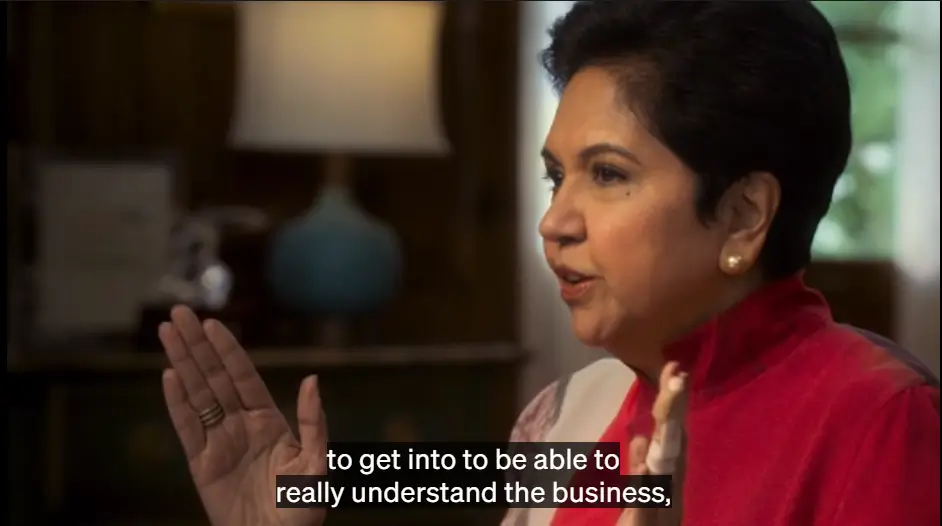
However, I have to warn you. You need to have a basic understanding of cost accounting to understand better when she talks about disaggregating costs and analyzing sales channels. Otherwise, the breaking down of costs and basing sales decisions on cost accounting won’t make much sense. You don’t have to be an expert, just a smidge of knowledge is enough.
Assignment: Follow the costs. She even suggests the product for this assignment. A bottle of beer. Information about the cost of manufacturing and selling them is publicly available. So, it’s easier to research them.
I loved the Zooming In On Your Team section. Nooyi advocates that you should learn the lower-level workings of your company, too, no matter how senior you are. She explains how she realized the older generation needs a different type of training to ease them into using technology. See, you gained an insight as well; this class is full of them.
Zooming out is similar to the eagle-eye view. It refers to the big ideas and a broader vision. She teaches you the 2×2 matrix to understand this technique. It’s surprising how many innovative ideas you can come up with using it.
Harnessing the Consumer Pull
The gist of this lesson video is that you need to understand how the customers (middlemen) and their stores work to create the consumer pull. You will understand how to use trading area analysis and interpreting it correctly could help you stock the store shelves! She also delves into the importance of creating a unique image and identity for each product in the product line.
In the case study of acquiring Tropicana, you will learn a lot. However, the lesson has jargon. You need to have studied something about branding and building loyalty to understand it. Otherwise, terms like loyalists, switchers, and heavy, medium, and low users will sound like gibberish.
Studying & Learning from Competitors
Competitors help you improve by keeping you on your toes. Be genuinely curious about their interesting products, be they long-term rivals or emerging ones. Learn from them to make your products even better than theirs.
Case Study: Bubly. It teaches that you should have the patience to come up with a better product or the best if possible. Bringing something unique to the market should be your goal not outshining your competitor’s bad product with a slightly better but still bad product of yours.
On a side note, she explains the barriers to new entry into the market. A new company needs patent protection, a unique manufacturing process, or a product so good it will become the defacto reference brand for that product category if it wants to last. Nooyi recommends buying the new company if it has all or even one of those.
Strategic Thinking
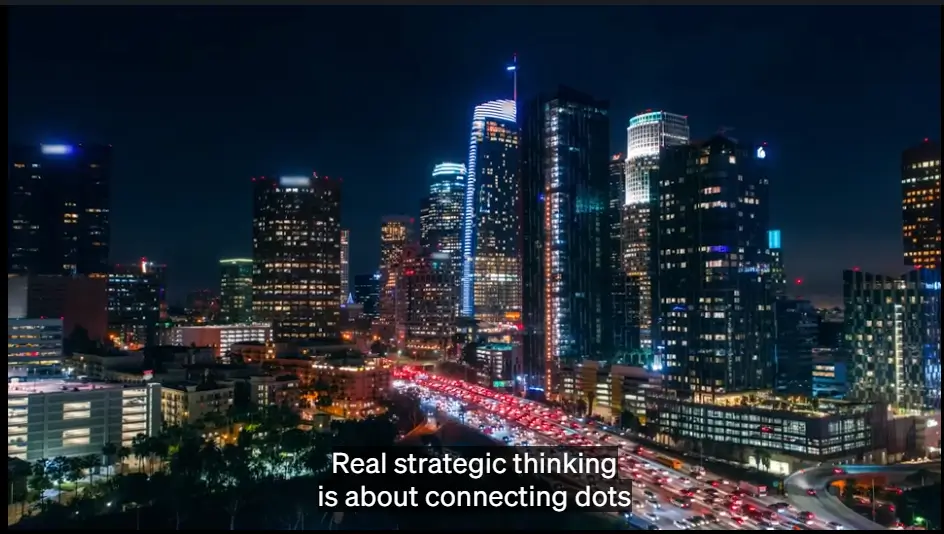
Strategic thinking is anticipating how the world will change in 5-10 years and preparing for those changes today. It’s dubbed Future-Back Thinking. It’s trying to see the bigger picture. Nooyi’s take on what is innovation is intriguing. Check it out. She also touches upon how new products and line extensions combine to contribute to a company’s growth.
You get two assignments in this class. One is to study companies that didn’t think future-back. The second one is to improve an existing product. As I said before, the assignments in this class are fantastic. Take this one for example; it’s already making you think of competing with a product by envisioning what could be improved.
Performance with Purpose
Performance With Purpose (PWP) is a strategy Nooyi came up with. It emphasizes human, environmental, and talent sustainability. She speaks about this in far more detail.
The strategy helped PepsiCo see tremendous success. She explains how she used megatrends to identify the changes required and how it helped her create PWP. Ready to see what megatrends are?
Megatrends
Nooyi says megatrends are transformative forces that change the world as you know it.
However, you have to be careful to separate short-term changes and fads from megatrends. She explains the importance of including all your departments to contribute ideas to tackle the megatrends.
An example of a megatrend she almost missed is e-commerce. Her sales team pointed it out and convinced her to prepare for it.
It’s tiny but phenomenal insights like these that made me like her class. And, I loved the next assignment she gave, too. You have to investigate the 2030 megatrends and figure out which of those will affect your company’s business.
However, knowing a megatrend can affect your business and creating a strategy to tackle it isn’t enough. You have to convince others that your strategy is right.
Nooyi helps you understand how to do that by talking about how she convinced the board to agree to PWP.
Engaging with Critics
Nooyi expresses that sincere communication tailored to suit the various groups of critics (while keeping the overall message the same) will prove beneficial. Working with them is better than working against them, right? She also explains how PepsiCo tailored the message of PWP to different groups to make them understand it. So, now you know how to deal with critics, too. Yay!
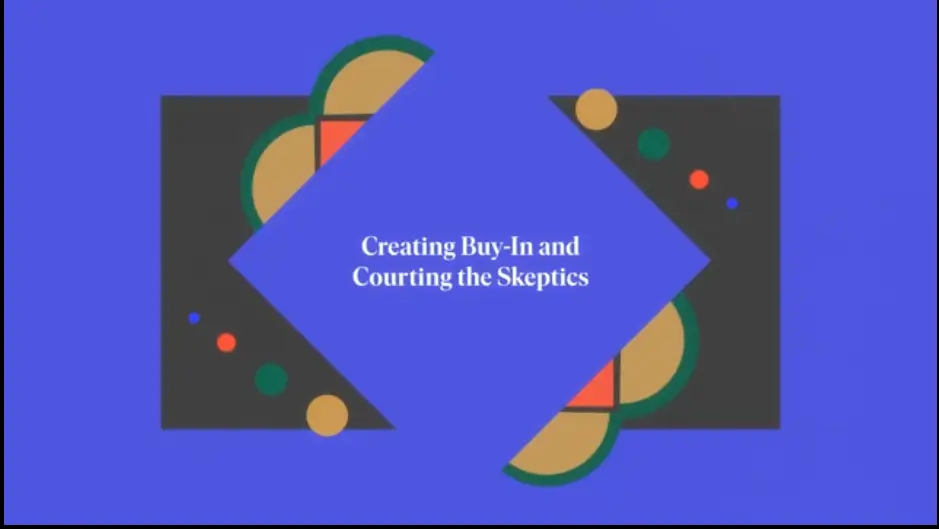
Turning Dream Into Reality
As long as you only talk about your strategy, it is just a dream. When you start allocating resources to execute that strategy, it becomes a reality. Nooyi helps us see how she brought in transformative people to make her dream a reality. You must have a solid grasp of core corporate finance to efficiently allocate resources.
You must have some work experience to understand most things explained in this section. If you don’t have that, don’t worry. Research the things you don’t understand. It all starts to make sense. Nooyi also emphasizes monitoring risks and progress. So many things you never considered could go wrong. You should know when to step in.
The thing I liked about this lesson video is that she didn’t shy away from revealing how PepsiCo, a giant in the food and beverage industry, failed to consider the noise the Sun Chips’ compostable bags made when they first launched it.
In their attempt to reduce their negative environmental footprint, they unwittingly (as some joked) contributed to noise pollution. PepsiCo withdrew the product, worked on making the compostable bag less noisy, and relaunched it. Moral of the story? Learn from your failures.
Nooyi then moves on to developing clear communication methods for checking progress. If you don’t do that, it simply means you don’t care about the project. You also understand how to have handy alternate plans and approaches at the ready if a particular idea or approach fails. The class almost makes me feel like I am running a business. I was so invested in what she had to say.
Global Change on a Local Level
This 6-minute lesson deals with how PepsiCo gave back to the communities it operates in. The stories of Lay’s new product made from Peru’s purple potatoes to give the local farmers a livelihood and the water-positive transformation in India are heartening to hear. It’s nice to know that big companies take up such projects as long as they are financially viable.
Evaluating Success
Nooyi relays in this 5-minute video how successful PWP was. She also explains how if they missed a goal, they analyzed the why and the what. Why did they miss it and what caused it? The success helped build PepsiCo’s credibility.
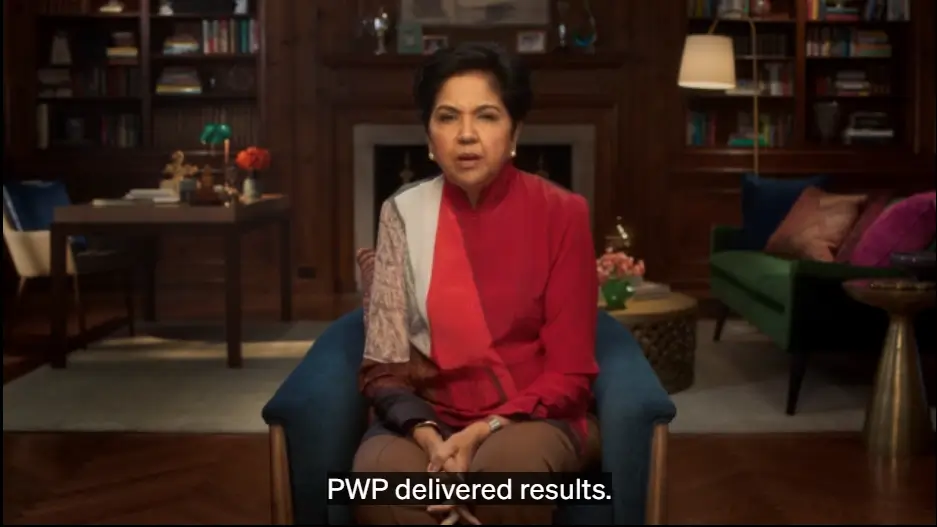
If you are wondering why we have been made to sit through the PWP strategy and its implementation, here is the answer. It helps you see how the 7 C’s mentioned earlier in the class made PWP’s success possible. So, this has been all one long, in-depth look into the 7 C’s of leadership.
Tackling Change in Organization’s Structure
Whatever the reason for making organizational changes may be, it’s still a painful process. Therefore, it is crucial that you plan for the next change. Nooyi’s class helps you understand how to iron out any issue in the design phase itself. She also provides pointers on how to deal with resistance you may face during these changes.
Valuable Case Studies
There are two interesting case studies in this masterclass.
First one is Indra Nooyi’s Megatrends of 2020s. She discusses the megatrends she thinks will occur in the next decade and what their impact will be.
This lesson is great for understanding what megatrends are if the previous explanations left you a bit confused. Your assignment for this lesson is to find the megatrends that affect your business and convert them into opportunities.
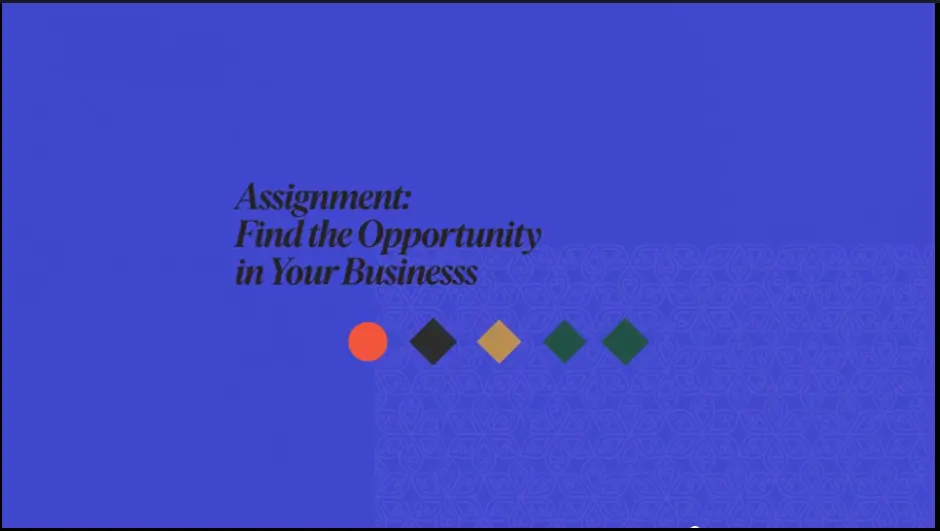
And the second case study is Leadership in a Crisis.
The Leadership in Crisis case study delves into Nooyi’s experience in the ReOpen Connecticut advisory group. In times of crisis, you don’t have time to think about strategy.
However, she provides insights into what could be done to arrive at a pragmatic (not perfect) solution. It is an interesting case study. Don’t miss it.
Indra Nooyi MasterClass Cost
The course cannot be bought individually.
You have to subscribe to the Standard, Plus, or Premium plan to access the courses on MasterClass. They usually cost $10, $15, and $20/month and are billed annually.
However, the Black Friday Sale (happening now) provides a discount of 30%, 40%, and 50% respectively for each plan.

Final Verdict: Is Indra Nooyi MasterClass Worth it?
Yes, the Indra Nooyi MasterClass is worth it. However, though anyone who wants to learn about leadership benefits from this class, I would say it is the business leaders and strategists that will benefit the most.
Want more? Watch what Indra Nooyi says about what you’ll learn and achieve by taking her masterclass.
FAQs
1. How long will it take to complete Indra Nooyi’s MasterClass?
The entire class is 2 hours and 59 minutes long and has 21 lessons. You can binge-watch it or take as much time as you want to complete it. MasterClass doesn’t set deadlines for completing the classes.
2. What do we learn from Indra Nooyi?
You learn a lot of things from her. However, here are the things that stand out: wielding the 7 C’s to successfully run a company, simplifying any complex problem or strategy, and genuinely caring about your business and the community.
3. Is Indra Nooyi MasterClass free?
No, you should subscribe to one of the MasterClass subscription plans to access any course on the platform. Once you subscribe you can access all 200+ courses on the site designed by various celebrities; that’s MasterClass’ allure.
4. Can I download Indra Nooyi MasterClass for offline viewing?
Yes, you can download it for offline viewing if you subscribe to the Plus or Premium plan.
5. Does MasterClass offer a refund?
MasterClass offers a 30-day money-back guarantee. You will get a refund if you request one within that period. No refund will be provided for subsequent subscription renewals.
